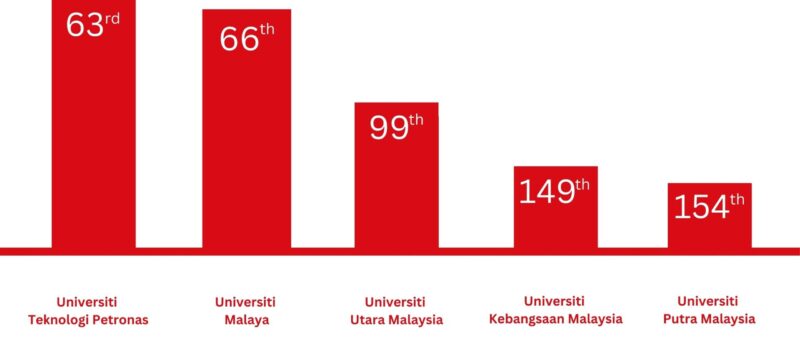This site
is mobile
responsive
Malaysia’s diverse, well-educated, multilingual, and trainable workforce serves as the foundation of its economic growth. Malaysia boasts 20 public and over 80 private universities, along with more than 1,400 technical and vocational education and training colleges (TVET) established by various ministries to bolster Malaysia’s talent pool.
Backed by the ongoing commitment of the Government to enhance human resource development across all sectors, Malaysia possesses one of the most highly skilled labour forces in the region. The typical Malaysian is proficient in speaking at least two or three languages, with high levels of proficiency in English. Moreover, those entering the workforce after completing their education typically have a minimum of 11 years of formal schooling.
The Malaysian Education Blueprint 2015-2025 promotes collaborations between universities and industries. It allows the industrial sectors to lead curriculum design as well as partner with programmes such as apprenticeships, hands-on training, real-life simulations and specialised employer training programmes.
Malaysia is gearing the next generation with essential skill sets for future employment. The Education Blueprint 2013-2025 focuses on enhancing STEM education, exposing students to programming and subjects related to robotics, AI, and computer science.
More than
The enhancement of the education standard remains a priority for Malaysia. This includes improving technical and vocational education and training (TVET), strengthening lifelong learning (LLL), and increasing the efficiency of the labour market to meet industry demands, particularly crucial in light of the Fourth Industrial Revolution (4IR) that significantly impacted education and training.
Recognising this situation, the Twelfth Malaysia Plan (12MP) prioritises the recalibration of the labour market to foster inclusive and sustainable growth and nurture future-ready talent.
As an upper-middle-income nation, Malaysia boasts a robust education system that receives significant emphasis under Malaysia’s five-year development plans. Our quality workforce is considered one of the region’s best, while public institutions of higher education are projected to enrol over 500,000 students with a growing emphasis on science and technical disciplines.
Total of

Total of

Total of

Total of
(Source: Quick Facts 2022, Ministry of Education)
The private sector has also set up educational institutions to supplement the government’s efforts to generate a larger pool of professionals and semi-professionals.
Various private colleges in Malaysia offer degree programmes on a twinning basis with overseas institutions of higher learning, while foreign universities such as Heriot-Watt University, University of Southampton Malaysia, Monash University Malaysia, Nottingham Malaysia, Newcastle University Medicine Malaysia, Curtin University in Sarawak, University of Reading Malaysia and Xiamen University Malaysia have set up branch campuses in the country. Educational institutions in Malaysia generate a large pool of professionals with degrees and post-graduate qualifications.
Internationally Ranked Universities

Source: Times Higher Education’s (THE) Asia University Rankings 2023
The Times Higher Education (THE) Asia University Rankings 2023 featured 16 of Malaysia’s public institutions. Universiti Teknologi Petronas secured the 63rd spot for 2023, while Universiti Utara Malaysia made significant improvements from the previous year.
Mastery of the German language is among the most important criteria besides academic achievements. It consists of Level B1 and B2, both of which are the third and fourth levels on the scale established by the Common European Framework of Reference for Languages (CEFR). In Malaysia, there are only two recognized examination centres by the collaborating partners in Germany, namely the Goethe Institute (GI) and telc-German-Malaysia Institute (telc-GMI).
– UMP Centre for Strategic Academic Collaboration (PKSA) Senior Executive Muhammad Hafiz Aswad Ahmad Kamal (2022)